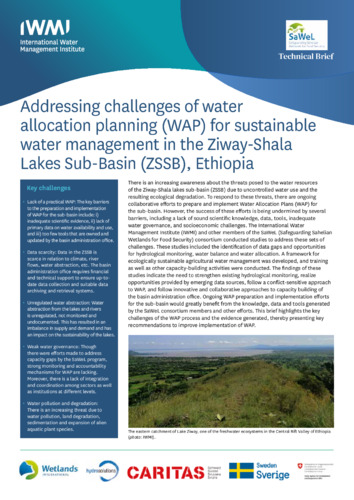Addressing challenges of water allocation planning (WAP) for sustainable water management in the Ziway-Shala Lakes Sub-Basin (ZSSB), Ethiopia
Abstract
There is an increasing awareness about the threats posed to the water resources of the Ziway-Shala lakes sub-basin (ZSSB) due to uncontrolled water use and the resulting ecological degradation. To respond to these threats, there are ongoing collaborative efforts to prepare and implement Water Allocation Plans (WAP) for the sub-basin. However, the success of these efforts is being undermined by several barriers, including a lack of sound scientific knowledge, data, tools, inadequate water governance, and socioeconomic challenges. The International Water Management Institute (IWMI) and other members of the SaWeL (Safeguarding Sahelian Wetlands for Food Security) consortium conducted studies to address these sets of challenges. These studies included the identification of data gaps and opportunities for hydrological monitoring, water balance and water allocation. A framework for ecologically sustainable agricultural water management was developed, and training as well as other capacity-building activities were conducted. The findings of these studies indicate the need to strengthen existing hydrological monitoring, realize opportunities provided by emerging data sources, follow a conflict-sensitive approach to WAP, and follow innovative and collaborative approaches to capacity building of the basin administration office. Ongoing WAP preparation and implementation efforts for the sub-basin would greatly benefit from the knowledge, data and tools generated by the SaWeL consortium members and other efforts. This brief highlights the key challenges of the WAP process and the evidence generated, thereby presenting key recommendations to improve implementation of WAP.

